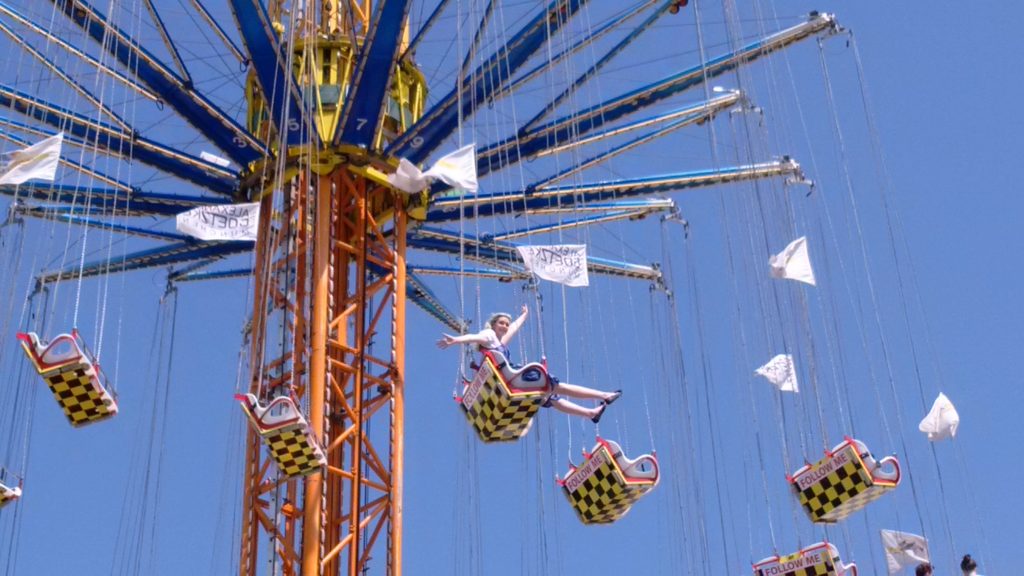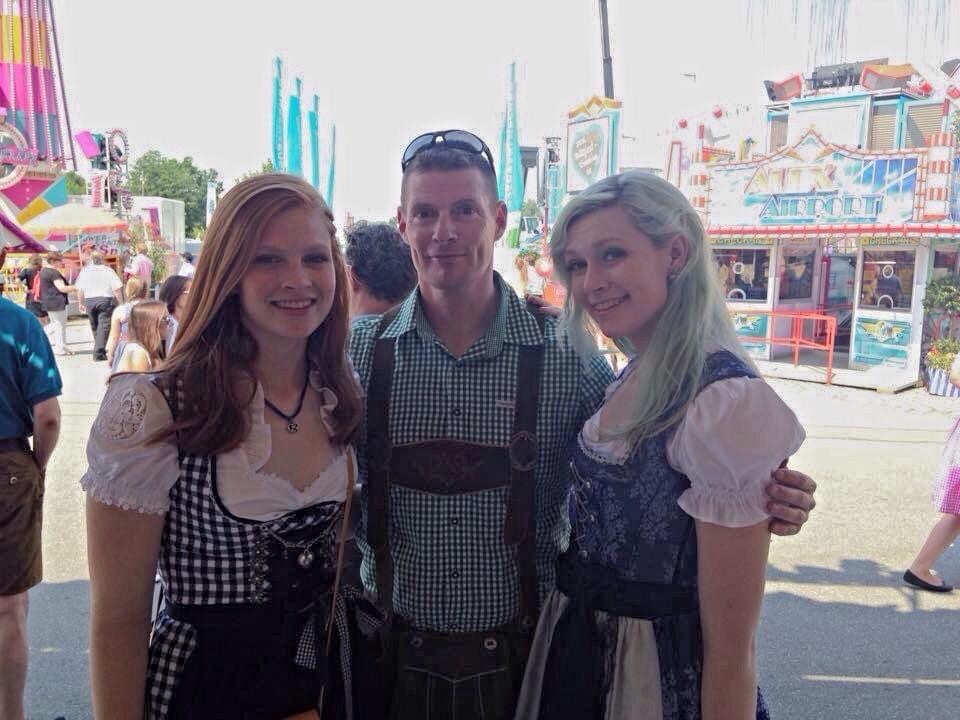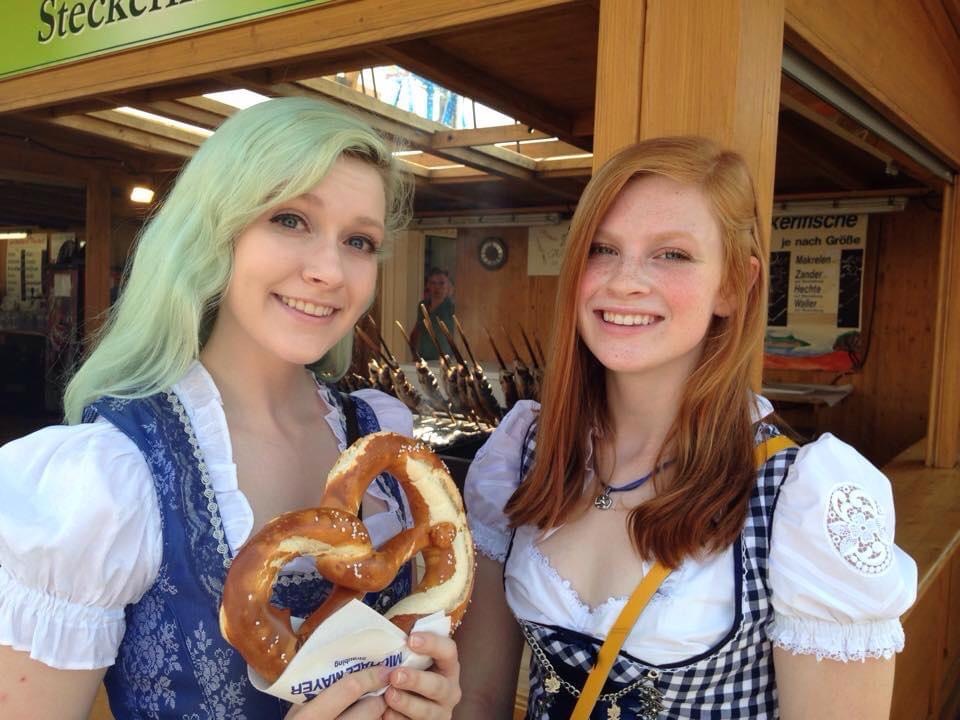Oktoberfest is in one month!! Wait, it starts in two weeks. What do you mean, it starts in September? Seriously, it’s OKTOBER-fest, right. Isn’t Oktober German for October? (Yes, yes, it is.) But it starts on the 16th of September? Hmm…. Why? What’s the deal with Oktoberfest?
Regardless of when it starts, Oktoberfest is a German celebration that is anticipated all year. Now, Germany is known for fests throughout the Spring, Summer and Fall. Every town has at least one, maybe a wine fest, maybe a music fest. The city center, the Marktplatz, will shut down, and stands will appear selling pretzels, wursts, brötchen, bier, wine, spatze, Käse-spaetzle and crepes. Crowds gather. The older generation will appear in traditional garb playing a polka. Some of them are even called Oktoberfest. But there is only one true Oktoberfest.
When we think of Germany, we typically picture green rolling hills, snowy castles, people in leather pants (record-scratch, I mean the traditional lederhosen!). While most of Germany shares some of these elements, we are actually picturing Bavaria. And Bavaria is home to Munich, and home to the one, the only, the big one; the mother of all fests: Oktoberfest.
The History
Oktoberfest traces to the 12th of October 1810. The Crown Prince Ludwig (the future King Ludwig I) married Princess Therese of Saxe-Hildburghausen and the Bayrisch citizenry was invited to a five-day celebration in Munich. The festival concluded with horse races held on a field named Theresienwiese—or Theresa’s Meadow. This event marked the beginning of a celebration which has been held annually since, excepting a few closures, mostly during both World Wars. Since its inception, the celebration has always been opened to the public but has morphed from a celebration of a wedding into, well, just a big celebration. Over time, parades and other carnival elements were added, and, in 1913, the beer tents for which it is probably most well-known. Seriously, who among us doesn’t equate Oktoberfest with a bar maid with a dozen steins in hand?
Oktoberfest Today
Oktoberfest is the largest Volksfest (people’s festival) in the world. It continues to be held annually in Munich, at Theresienwiese, known as Wiesn to the locals. It generally runs from mid-September to the first Sunday in October. (If German Reunification Day—the 3rd of October—falls on the Monday or Tuesday after the first Sunday, then the festival will end on that day.)
The opening day begins with the Festival of the Innkeepers, a parade tracing a route from the city to the fairgrounds and including a procession of horse-drawn brewer wagons transporting the ceremonial first beer kegs to their respective tents. The Bürgermeister (mayor of Munich) will tap the first keg to open the festival at noon. From there the festival opens and the fun begins. There are more parades, including a traditional costume parade on the second day of the festival, music, dancing, drinking, and eating throughout the festival.
Although patrons wander throughout the carnival, enjoying games and rides, and browsing the many stands, pretty much everybody will eventually find their way to the beer tents. Each of the local breweries erect a temporary—but elaborate—beer tent that is actually made of plywood and include balconies and bandstands. The largest seat more than 10,000 people; they need to be large to serve the more than two million gallons of beer served each year! There are currently seventeen large tents and twenty-one smaller tents. Supposedly the large tents are beer first, food second, and the smaller tents are food first, beer second, but the fact is food and beer are plentiful everywhere. However, only beer brewed within the city limits of Munich can be served at the festival. Picture a tent full of fest tables and benches, shoulder to shoulder, a polka band, and lots of shouting (but all in fun). And, everywhere, the blue and white colors of Bavaria fly over everything.
If you find a place to sit, there are only a few things to remember. First, “ein Bier, bitte,” while holding up one thumb. “Zwei Bier” if you are thirsty, with thumb and index finger up. “Ein mal, bitte” if you want one more. (For us non-drinkers, insert ‘cola’ to get a warm cola—yes, it will be warm.) Then, there is the singing. You WILL sing, whether you want to or not. Depending on the crowd, roughly every fifteen or twenty minutes, the bandleader will cry out “die Krüge hoch!” meaning to raise your mugs up. After doing so a couple of times to fire the crowd up, the band will play, and the crowd will sing the most popular song in Germany. The lyrics are simple: “Ein Pro-sit, ein Pro-o-sit. Der Gemüt-lich-keit,” sung twice. This is basically proposing a toast to our good health and good feelings. Don’t worry, you’ll catch on to the tune. At the end, the band leader will call out, “one, two, three, drink!” All will hoist their mug and yell “próst!”
Also, inside the tents, there is a lot of music, dancing, and other types of fun such as contests (some of which involve more drinking). Although a percentage of seats are non-reservable, it is a good idea to make a reservation, if possible, especially if you are attending with a large group (always a lot of fun). To make a reservation, go to this website.
What if you don’t want to spend the day drinking? No worries, it is possible to enjoy the festivities and remain sober. As ones who do not drink, we were always able to enjoy the festivities in a beer tent eating and visiting with friends. If you prefer something a little more low-key, the festival has quiet hours (check the website for current times) before the volume is turned up. There are family days with discounts for children, as well as child-friendly areas at the festival. Children are allowed in the tents before 8pm, and after 8pm children 6-16 years of age can remain under the supervision of a parent. To check which times will be most crowded, check out the Oktoberfest Baramoter.
If you want to get into the spirit of the fest, go native! Yes, I mean, get your own traditional German clothing (called trachten). Obviously, not everybody does so, German or American, but we were once told by the Bürgermeister of the town we were stationed near that so many Americans wore tracthen to their fest it had inspired the Germans to bring it back! If you are interested, you can rent it; lederhosen, shirt and shoes for the men and a dirndl for the ladies. Or you can choose to buy it. Trachten is readily available in specialty stores throughout Bavaria (such as Moser), and even in the grocery stores in the months leading up to the fest. If you buy it, you have it for all the other fests you will go to! (On being stationed in Bavaria, we were advised to buy it since we would have many opportunities to wear it. Note: I will NOT share what they say constitutes being ‘broken in’ for the lederhosen.) For the trachten die-hards, there are hats, hand-made feathers, and plenty of accessories to choose from, though they are costly.
The Details
Entrance to the fair grounds and beer tents is free of charge, although there may be a line waiting to get in as bags are checked. Strollers and wheelchairs are allowed at Octoberfest until 6pm if it is not too crowded. The exceptions are Saturdays and October 3rd when they are not allowed at all. The fairgrounds are flat and easy to maneuver for our friends with limited mobility, although it would be best to attend early on a weekday if you wish to avoid the crowds. Oktoberfest is a cash only event, but there are plenty of ATMs on site. For parking and public transport information, visit this website.
Still here? Oh yeah, the Oktoberfest in September thing. You wanted an answer? Well, Germany is starting to get cold in October! When they lengthened the fest, they put that additional time on the front end, while it was still warm.
Whether you go for food, drinking, or fun, check out Oktoberfest in Munich for the atmosphere at least once. Find the day with the activities and the time that is most appealing for you, and head to Munich! Maybe you aren’t flying to Munich this year, but if you get the opportunity to hit the local bier garten—wherever you are—don’t miss the opportunity to go, and if nobody else is signing it, it’s up to you: Ein Pro-sit, ein Pro-o-sit. Der Gemüt-lich-keit!
Prost!!



